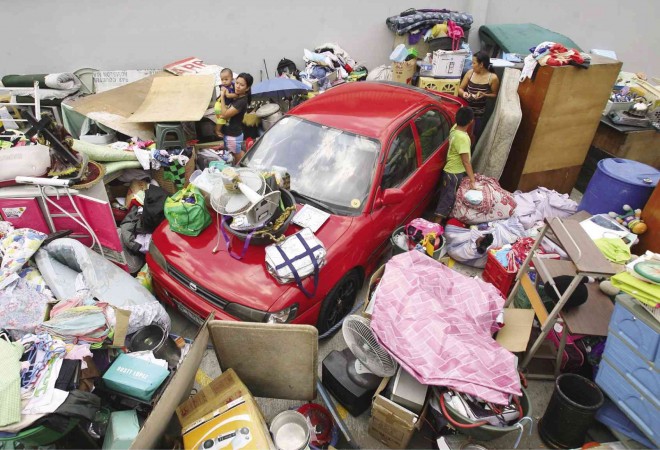
NO TIME TO PACK. Evicted families are forced into the streets with their belongings during the April 2013 demolition of a squatter community in Barangay Sto. Domingo, Quezon City. Under a recently approved House bill, the government must provide them with relocation sites either within the city or not too far from the demolished shantytown. FILE PHOTO
Not too harsh, not too far.
The House of Representatives has approved a bill that mandates the relocation of informal settlers within or near the cities where they live, instead of putting them in far-flung places away from livelihood opportunities.
The chamber passed House Bill No. 5144, or the proposed “On-site, In-City, Near-City Resettlement Act,” on third and final reading, amending Republic Act No. 7279, or the Urban Development and Housing Act of 1992.
The bill aims to ensure “safe, affordable, decent and humane” relocation of informal settlers, provide them adequate social preparations, and prevent forced evictions.
It also seeks to “upgrade informal settlements from areas of abject poverty, social exclusion, unsafe housing, and underdevelopment into communities with enhanced physical living conditions and improved quality of life.”
It provides for relocation sites that are “fully integrated into a city’s or an urban area’s physical and socioeconomic fabric and urban governance system.”
In a statement, Negros Occidental Rep. Alfredo B. Benitez, chair of the House committee on housing and urban development, expressed his gratitude to his colleagues for approving the bill.
Under the proposed law, informal settler families shall be empowered by making them “active partners of government in the planning and management of their own resettlement with specific focus on their housing needs and aspirations.”
The measure also aims to ensure the sustainability and viability of resettlement projects near cities by ensuring their access to services and employment opportunities in case on-site resettlement cannot be undertaken.
The bill provides for the formation of the affected families into a beneficiary association that will create a “People’s Plan” in coordination with the Presidential Commission for the Urban Poor that is responsible for the social preparations for resettlement.
The beneficiary association shall come up with a “Relocation Action Plan” for site development with the assistance of civil society organizations and concerned government agencies.
This will involve the development of nonphysical components of resettlement, such as the establishment of self-help housing cooperatives, livelihood programs and capacity-building initiatives.